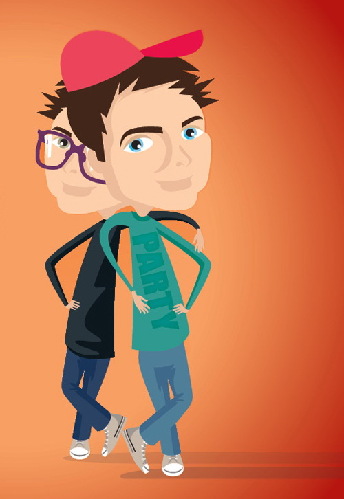|

This past January, the newly published book Quiet: The Power of Introverts in a World That Can't Stop Talking opened up personality type for public debate. Its author Susan Cain argues that we live in a culture that is biased against introverts. In the last few decades, she says, the "extrovert ideal" has transformed workplaces.
Instead of embracing their serious, often quiet and reflective traits, introverts are encouraged to act like extroverts – assertive, outgoing types that love teamwork, networking and thinking out loud. This, Cain says, leads to a "colossal waste of talent, energy and happiness." Palesa Temaswati Mthethwa, a South African freelance writer and graphic designer at the Beijing Institute of Fashion Technology, and Yu Yanjuan, the editor of Student English Times based in Beijing, have their own interpretations of Cain's argument.
Globalized Extroversion
by Palesa Temaswati Mthethwa
In our world, people are characterized by so many words: tough, weak, black, white, female, male, yin and yang, young and old. Added to that list in the 1900s were "introvert" and "extrovert."
During the early 20th century, the famous psychologist Carl Gustav Jung popularized the terms "introversion" and "extroversion" as two ends of a scale on which we all feature. Those more on the introversion side of the scale, he explained, focus more on inner activity than the outside world, while individuals more on the extroversion side behave in the reverse.
I definitely fall more on the extroversion side of the scale. Growing up as an only child I always sought attention from others. This made me more gregarious, and I tended to fade when alone. I was easily energized being around other people.
Personality is important, especially when it comes to communication, which is key to successful relationships at work, school or with a loved one. American society prizes extroversion, and since America is a country many want to be associated with, the world has become the same. The popular image of an American is the happy outgoing extrovert, busy and surrounded by many people. All kinds of media depict this image.
When I first came to China, so many Chinese people I met seemed like introverts. Most were shy around foreigners, and even though they could speak English they spoke in low tones.
Now, after four years, China has changed its tack. People have begun to embrace foreigners more, and are bubbly, fun and outgoing – in other words, extroverts! Companies have invested money and time in promoting more foreign faces, enlisting foreign professionals to help local employees with presentation skills and etiquette needed to attract clients. The country has realized that knowing a language is one thing, but having a personality that can charm anybody's socks off is important for a successful business.
So does it help to be an extrovert in today's modern society? Yes, but if you're an introvert this doesn't mean you won't succeed. Faking it for a few minuets is what we all do anyway. Contrary to common belief, many notable successful people are introverts, including business virtuosos Bill Gates and Warren Buffett, and actor-directors like Clint Eastwood and Woody Allen.
Introverts and extroverts alike are wondrous people. They should be appreciated for their own characters and not the scale that separates us.
Introverted in an Extroverted Culture
by Yu Yanjuan
Before China opened up in the late 1970s, Chinese culture placed more emphasis on introversion, guided by expressions like "silence is gold" and "still water goes deep." But with globalization our society is becoming increasingly competitive. Rarely do people have the time or patience to enjoy what introverts have to offer. Now, children are encouraged to be open and aggressively assertive. Introverts who fail to do the same get fewer opportunities.
Susan Cain says that introverts prefer quiet environments and think before they speak. By her definition, I'm an introvert at work. I'm quite cautious and tend to make careful preparations before taking action. As an editor, this tendency fits my responsibilities perfectly. I measure every word and polish every sentence before I allow my work to go to print.
Socially, my personality is something between an introvert and extrovert. But perhaps that's due to the culture's overemphasis on extroversion, because extroverts look more outgoing and are more likely to be surrounded by friends, and I don't want to be categorized as a "loner" at social gatherings.
My husband is such an introverted person, especially in his social life. At parties, he's always sitting in a quiet corner. When spoken to, he listens to what's being said carefully and politely. But he has more friends than some extroverts I know. (Listening is a rare social skill.) Despite the social bias against introverts, I married him. I was attracted to his quiet charm.
We live immersed in stereotypes. Cain warns that we exaggerate the capability of extroverts too much. While I agree with her, I also think that we hold impractical stereotypes about everyone. Our fixed ideas about introverts and extroverts influence our judgment either way, as was the case recently at my newspaper.
Our annual editor's award was presented recently to a total introvert. This man talks so little that you can hardly feel his presence. The managers awarded him the prize under the assumption that introverts are more devoted to their jobs. But the fact is this introvert wasn't a great editor. He spent much of his quiet time in the office reading novels online. When it came to the award, the managers' stereotype affected their judgment.
We should stop worshiping people on the basis of their personality type. I think much of what we see is just an illusion. At the end of the day, varied industries need people of all kinds of personalities. |